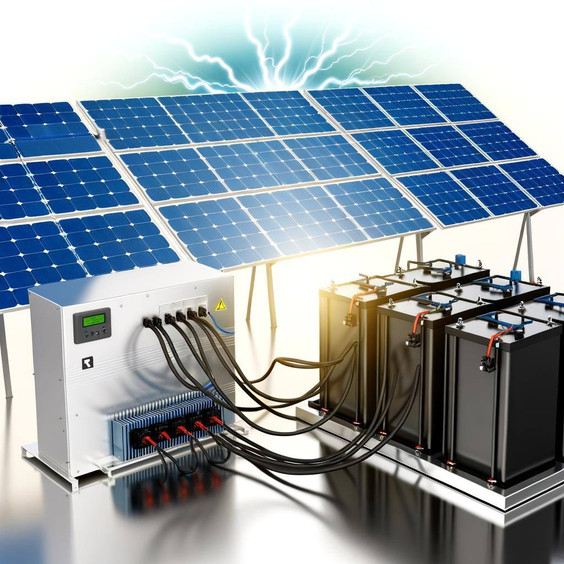Posted by Nastech on 8th Aug 2024
Whats is a High Voltage Hybrid inverter? What are Key Differences vs. Low Voltage Hybrid Inverters
Explore the pivotal differences between high and low voltage hybrid inverters and how these variations can influence your choice in sustainable energy solutions.

Understanding High Voltage Hybrid Inverters: Definitions and Basic
High voltage hybrid inverters are sophisticated devices that convert DC (direct current) from high voltage batteries or solar panels into AC (alternating current) for use in residential or commercial electrical systems. These inverters are typically used in systems where batteries have a voltage range significantly higher than the standard 12V, 24V, or 48V—often upwards of 300V. High voltage hybrid inverters are preferred in applications requiring greater efficiency and power capacity, making them suitable for larger installations or those with space constraints.
These inverters also integrate seamlessly with battery storage systems, enabling the storage of excess energy generated during peak times for later use. They often include advanced features like energy management and smart grid capabilities, making them more adaptable to modern energy demands.
Core Differences in Battery Charging Voltage Specifications
The primary difference between high and low voltage hybrid inverters lies in their compatibility with the battery charging voltage. High voltage inverters work with batteries that have higher voltage ratings, which means fewer parallel connections are required to achieve the desired energy storage capacity. This leads to a more straightforward and less bulky system installation.
Low voltage inverters, on the other hand, are designed to work with batteries that have lower voltage ratings. These systems often require more batteries connected in parallel to reach the necessary capacity, which can result in more complex wiring and potential for energy loss due to increased resistance in the cables.
Impact of Voltage Levels on Performance and Efficiency
Voltage levels have a direct impact on the performance and efficiency of a hybrid inverter. High voltage hybrid inverters typically offer better efficiency due to lower current flow, resulting in less energy loss through heat. This also reduces the wear on components, potentially extending the lifespan of the inverter.
Low voltage inverters may experience higher losses as they operate at higher currents, which can increase heat production and reduce system efficiency. However, they are often more affordable and can be more suitable for small-scale installations or for users with limited energy needs.
Choosing the Right Battery Voltage for Your Needs: High vs. Low
Selecting the proper battery voltage for a hybrid inverter system depends on several factors including the scale of the energy system, installation space, budget, and efficiency requirements. High voltage systems are generally preferred for larger installations or when space is at a premium, as they can offer more power in a compact form. They are also beneficial in reducing cable thickness and installation complexity.
Low voltage systems, while potentially less efficient, can be more cost-effective and are often easier to install and maintain. They are ideal for small to medium-sized applications or for individuals just starting with solar energy systems.
Top Sources for Purchasing Hybrid Inverters
Hybrid inverters can be purchased from various sources, including specialized renewable energy suppliers, online marketplaces, and directly from manufacturers. When selecting a hybrid inverter, it's essential to ensure that the supplier provides reliable customer support and warranties.
Renowned brands such as Deye, Solis, LuxPower, and Atess offer high-quality hybrid inverters with robust support networks. These inverters are well-regarded for their efficiency and reliability, making them popular choices for residential and commercial solar installations.
For those looking to purchase, Nastech Solar is a trusted supplier that provides a range of these top-tier inverters. You can explore their offerings through their official website or contact their sales team for personalized assistance. Additionally, you can find these brands on major online platforms like Amazon, eBay, or Alibaba, which offer a broad selection of options.
It's also advisable to consult with a professional installer to determine the most suitable inverter for your specific needs and to ensure a safe and efficient installation.

